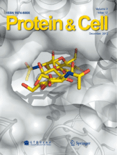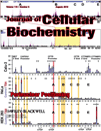
JOURNAL OF RECEPTORS AND SIGNAL TRANSDUCTION
Scope & Guideline
Pioneering Insights into Cellular Communication
Introduction
Aims and Scopes
- Receptor Pharmacology and Signaling Mechanisms:
This area encompasses studies exploring the pharmacological properties of various receptors, including GPCRs and ion channels, and their downstream signaling pathways. The aim is to elucidate the molecular mechanisms involved in receptor activation and modulation. - In Silico and Computational Approaches:
The journal features research utilizing molecular docking, dynamics simulations, and QSAR modeling to predict interactions between receptors and potential therapeutic compounds, underscoring the importance of computational methods in drug discovery. - Therapeutic Applications and Drug Discovery:
Research focusing on the identification of novel receptor agonists and antagonists, particularly in the context of diseases such as cancer, diabetes, and neurodegenerative disorders, highlighting innovative therapeutic strategies. - Pathophysiological Roles of Receptors:
Investigations into the roles of receptors in various diseases, including cancer, cardiovascular disorders, and metabolic syndromes, emphasizing the clinical relevance of receptor biology. - Cross-talk Between Signaling Pathways:
Studies that explore interactions between different signaling pathways mediated by receptors, which can provide insights into complex regulatory mechanisms in cellular responses.
Trending and Emerging
- Targeted Therapy and Precision Medicine:
An increasing number of studies are focusing on targeted therapies that exploit specific receptor pathways for precision treatment in diseases like cancer, highlighting the shift towards personalized medicine. - Role of Non-Coding RNAs in Receptor Signaling:
Research on microRNAs and long non-coding RNAs that modulate receptor signaling pathways is gaining prominence, indicating a growing interest in the regulatory roles of these molecules in health and disease. - In Vitro and In Vivo Models for Drug Testing:
There is a notable trend towards utilizing advanced in vitro and in vivo models to study receptor functions and therapeutic interventions, enhancing the translational aspect of receptor research. - Integrative Approaches Combining Multiple Modalities:
Emerging studies are increasingly adopting integrative methodologies that combine computational, biochemical, and cellular techniques to provide comprehensive insights into receptor signaling and pharmacology. - Impact of Environmental Factors on Receptor Function:
Research exploring how environmental changes, such as hypoxia or oxidative stress, influence receptor activities and signaling pathways is becoming more prevalent, reflecting a broader understanding of receptor biology in physiological contexts.
Declining or Waning
- Traditional Pharmacology of Known Receptors:
Research that solely focuses on well-characterized receptors without exploring novel therapeutic implications or innovative methodologies is less frequently published. This shift indicates a move towards more complex and novel studies involving receptor interactions and signaling. - Basic Mechanistic Studies without Clinical Relevance:
There has been a noticeable decline in purely mechanistic studies that do not connect to clinical applications or therapeutic potential, reflecting a growing expectation for research to have direct implications for treatment or drug development. - Exploration of Less Studied Receptors:
Research on lesser-known or orphan receptors appears to be waning, as the journal increasingly prioritizes studies that focus on prominent receptors with established clinical relevance, potentially due to the demand for impactful findings.
Similar Journals

MOLECULAR AND CELLULAR PROBES
Advancing Insights into Cellular MechanismsMOLECULAR AND CELLULAR PROBES, published by Academic Press Ltd - Elsevier Science Ltd, stands as a prominent journal at the intersection of cell and molecular biology. With an ISSN of 0890-8508 and an E-ISSN of 1096-1194, this journal has consistently contributed to the scientific discourse since its inception in 1987, converging its scholarly content through to 2024. As a member of Q3 in both Cell Biology and Molecular Biology categories, it provides a platform for innovative research and critical insights into cellular mechanisms, signaling pathways, and molecular interactions. Its Scopus rankings position it within the top half of its categories, fostering a vibrant academic community that supports the exploration and advancement of biochemistry, genetics, and molecular biology. Although it does not currently offer Open Access, the high-quality peer-reviewed articles published in MOLECULAR AND CELLULAR PROBES are invaluable resources for researchers, professionals, and students who seek to stay at the forefront of breakthroughs in these essential fields.

JOURNAL OF BIOENERGETICS AND BIOMEMBRANES
Innovating Insights into Membrane Dynamics and FunctionJOURNAL OF BIOENERGETICS AND BIOMEMBRANES, published by SPRINGER/PLENUM PUBLISHERS, is a leading journal dedicated to the study of bioenergetics and biomembranes, covering essential topics such as cellular energy transformation and membrane dynamics. Since its inception in 1976, the journal has developed a robust reputation within the scientific community, currently holding a Q3 ranking in Cell Biology and a Q2 ranking in Physiology for 2023. Boasting a prestigious Scopus Rank in both Biochemistry and Physiology, it serves as a crucial platform for disseminating pioneering research findings. With its commitment to quality and innovation, the journal plays a significant role in advancing our understanding of the fundamental processes that underlie life at the cellular level. Although it does not offer open access options, the journal remains accessible through universities and research institutions, ensuring that vital research is widely shared among scholars, professionals, and students alike. The JOURNAL OF BIOENERGETICS AND BIOMEMBRANES is essential for anyone seeking to contribute to or stay informed about developments in this dynamic field.

Biomolecules & Therapeutics
Innovating Drug Discovery through Rigorous ScienceBiomolecules & Therapeutics is a prominent journal published by the Korean Society of Applied Pharmacology, dedicated to advancing knowledge in the fields of Biochemistry, Drug Discovery, Molecular Medicine, and Pharmacology. With an ISSN of 1976-9148 and an E-ISSN of 2005-4483, this journal serves as a vital platform for researchers and professionals to disseminate their findings from 2008 through 2024. Ranking in the Q2 category across multiple relevant fields, including Pharmacology and Drug Discovery, and consistently placing in the 60th to 70th percentiles in Scopus rankings, Biomolecules & Therapeutics exemplifies a commitment to high-quality research and scientific integrity. Although it operates on a traditional access model, readers can be assured of the journal's rigorous peer-review process, ensuring that published articles contribute meaningfully to ongoing discourse in pharmacological and biochemical research. Located in Seoul, South Korea, the journal stands at the forefront of innovation in healthcare, making it an essential resource for academics, students, and industry professionals alike.

MOLECULAR AND CELLULAR BIOLOGY
Driving Innovation in Molecular and Cellular ScienceMOLECULAR AND CELLULAR BIOLOGY, published by TAYLOR & FRANCIS INC, stands as a preeminent platform for researchers, professionals, and students engaged in the dynamic field of molecular and cellular biology. Established in 1981 and ongoing into 2024, the journal features cutting-edge research that spans across vital sub-disciplines, garnering a strong impact in its contributions to the scientific community. With an impressive Q2 ranking in Cell Biology and Q1 ranking in Molecular Biology for 2023, it consistently publishes high-quality articles that reflect the latest advancements and discoveries within the field. The journal is particularly well-regarded for its rigorous peer-review process and commitment to scientific excellence, making it an invaluable resource for those seeking to deepen their understanding of molecular mechanisms and cellular processes. Although not open access, the journal offers diverse access options for researchers to reach the latest findings. By maintaining a strong focus on biochemistry, genetics, and molecular biology, MOLECULAR AND CELLULAR BIOLOGY remains essential reading for anyone looking to contribute to or stay informed about significant developments within this pivotal area of study.

Protein & Cell
Advancing Knowledge in Biochemistry and Cell BiologyProtein & Cell, published by Oxford University Press, is a distinguished international journal focusing on cutting-edge research in the fields of biochemistry, biotechnology, cell biology, and drug discovery. This open access journal, active since 2014, is dedicated to disseminating innovative findings that advance our understanding of protein functions and cellular processes, making it an essential resource for researchers, professionals, and students alike. With an impressive 2023 impact factor reflected in its Q1 ranking across multiple categories such as Biochemistry, Drug Discovery, and Cell Biology, 'Protein & Cell' stands at the forefront of scientific research, driving collaboration and discussion in the scientific community. Researchers can access the journal freely online, fostering a global exchange of knowledge and contributing to significant advancements in medicine and biotechnology. Located in the United Kingdom, the journal strives to be a pivotal platform for impactful research that influences future studies and applications.

JOURNAL OF ASIAN NATURAL PRODUCTS RESEARCH
Fostering Collaboration for Groundbreaking ResearchJOURNAL OF ASIAN NATURAL PRODUCTS RESEARCH is a prestigious publication in the field of natural products, focusing on valuable research spanning analytical chemistry, pharmacology, and complementary medicine. Published by Taylor & Francis Ltd in the United Kingdom, this journal has established itself as a key resource for academics and professionals seeking to explore advancements in drug discovery and organic chemistry. With a converged publication timeline from 1998 to 2024, the journal boasts several commendable category quartiles as of 2023, reflecting its robust standing in the research community: Q2 in Complementary and Alternative Medicine, Q3 in multiple domains including Analytical Chemistry and Organic Chemistry, and Q4 in Molecular Medicine. Although it currently does not offer open access, the journal remains a valuable compendium for empirical research and innovative studies in areas such as pharmacology and medicinal chemistry. Researchers, professionals, and students alike will find the JOURNAL OF ASIAN NATURAL PRODUCTS RESEARCH to be an essential platform for sharing groundbreaking findings and fostering collaborations that lead to significant advancements in science and health.

Purinergic Signalling
Exploring the Frontiers of Purinergic ResearchPurinergic Signalling, published by Springer, is a pivotal academic journal dedicated to the exploration of purinergic signaling pathways and their implications in various biological processes. Since its inception in 2004, the journal has made significant contributions to the fields of Cell Biology, Cellular and Molecular Neuroscience, and Molecular Biology, consistently ranking in the Q3 category in recent assessments. With a strong focus on the molecular mechanisms of purines and their roles in physiology and pathology, Purinergic Signalling serves as an essential resource for researchers and professionals seeking to understand the complexity of cellular communication. Although it does not offer open access, the journal ensures a broad dissemination of high-quality research findings, making it a vital tool for academic advancement in the fields of neuroscience and molecular biology. Its commitment to scholarly excellence is reflected in its Scopus rankings, where it is competitively positioned within its categories. As we approach its 20th anniversary in 2024, Purinergic Signalling continues to inspire and inform cutting-edge research in the dynamic landscape of life sciences.

BMC Molecular and Cell Biology
Bridging knowledge gaps in the biological sciences.BMC Molecular and Cell Biology is a forward-thinking open-access journal published by BMC, specializing in the vital fields of molecular biology and cell biology. Since its inception in 2019, the journal has carved a niche for itself, ranking in the Q3 quartile in both Cell Biology and Molecular Biology categories as of 2023. With an ISSN of N/A and an E-ISSN of 2661-8850, the journal provides a platform for groundbreaking research, high-quality reviews, and innovative methodologies. Situated in the United Kingdom, BMC Molecular and Cell Biology promotes a diverse range of studies, addressing fundamental questions in biology that resonate with both experts and new researchers alike. The journal's commitment to open access ensures that valuable findings are readily available to the global scientific community, fostering collaboration and knowledge-sharing across disciplines. Researchers aiming to contribute to the field of cell and molecular biology will find this journal an indispensable resource for both publishing and staying informed on the latest advances.

MOLECULAR AND CELLULAR BIOCHEMISTRY
Connecting Molecular Insights to Clinical ApplicationsMOLECULAR AND CELLULAR BIOCHEMISTRY, an esteemed journal published by SPRINGER, serves as a prominent platform in the fields of biochemistry and molecular biology. With a history of dissemination since 1973, this journal has made significant contributions to the understanding of biochemical processes at the molecular level. The MOLECULAR AND CELLULAR BIOCHEMISTRY journal focuses on a myriad of topics including but not limited to cellular biochemistry, clinical biochemistry, and interdisciplinary approaches in medicine, boasting a commendable categorization in the 2023 Scopus ranks where it falls under Q3 in Cell Biology, Q2 in Clinical Biochemistry, Q1 in Medicine (miscellaneous), and Q2 in Molecular Biology. Although the journal is not open access, it provides access options through institutional subscriptions, making valuable research accessible to a wider audience. With its rigorous peer-review process and high impact within the scientific community, this journal aims to advance knowledge and stimulate exploration in biochemical research, making it essential reading for researchers, professionals, and students alike.

JOURNAL OF CELLULAR BIOCHEMISTRY
Advancing the Frontiers of Biochemical ResearchJournal of Cellular Biochemistry is a premier academic journal dedicated to advancing the field of biochemistry and cellular biology. Published by Wiley, this influential journal has a significant impact factor that underscores its relevance and authority within the scientific community. With its ISSN 0730-2312 and E-ISSN 1097-4644, the journal has been on the frontier of research since its inception in 1982, and is expected to continue publishing cutting-edge studies through 2024. As evidenced by its ranking in the 2023 Scopus Quartiles, it holds a rank of Q2 in Biochemistry and Q3 in both Cell and Molecular Biology, placing it among the top tiers of scientific journals in these disciplines. The Journal of Cellular Biochemistry serves as a vital resource for researchers, professionals, and students alike, providing a platform for the dissemination of innovative ideas and findings that shape our understanding of cellular processes and biochemical pathways. Though it does not currently offer Open Access options, its robust peer-review process ensures that each publication meets the highest academic standards, thus solidifying its esteemed position in the landscape of biochemical research.